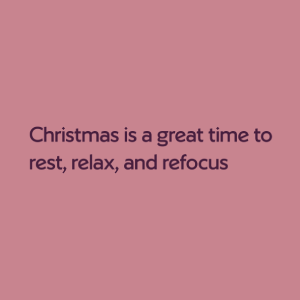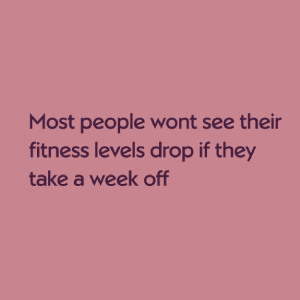How taking a fitness break at Christmas can help you
- Overview
Whether you’re thinking of taking a week off or toning your regular exercise regime down over Christmas, find out how to do it the right way and what to expect when you return.
The benefits of a rest week

Taking a workout break over Christmas is great for our mental and physical health.
Mentally, it allows us to recharge, refocus, and spend time with friends and family. The collective relaxed attitude towards food, drink, and having a good time means many people use the week over Christmas to relax their exercise regime and relax.
Physically, taking some time off can help with injury prevention in the long term. It allows our muscles and joints to recover from potentially prolonged stress, which in turn reduces our risk of injuries and the amount of time we have to take off in the long run.
Recharge, relax, and refocus
Rest isn’t just about letting the body heal.
The Christmas break provides mental relief, lowering stress levels and promoting overall wellbeing as well as some mental rejuvenation. Continuous training can lead to mental fatigue and increased stress, making time off a great opportunity for some well-deserved mental relaxation.
Lowering stress levels
Intense or prolonged exercise will elevate cortisol levels, especially if you regularly engage in high-intensity exercise. Cortisol is a hormone that gets released when you are physically or mentally stressed.
Prolonged periods of elevated cortisol levels can have an impact on mood and mental health, with high levels of cortisol being linked to anxiety. By taking a week off, you lower cortisol levels in your blood which will mean you come back stronger after your break.
Will I lose fitness if I take a week off at Christmas?

Ultimately, taking a week off will have marginal training implications, with some evidence even suggesting that it can improve performance/recovery.
You may see a slight drop in your fitness if you drop all exercise over Christmas, but most people will find they return to their previous levels of fitness relatively quickly.
If you’re concerned about losing fitness, try evaluating what your goals are. If you have a race coming up, taking a week off is probably not the best idea. If you’re simply maintaining fitness, remember that rest and recovery are just as important as performance and that taking a week off to appreciate friends, family, food, and what really matters can help prevent burnout and overtraining in the long run.
Adjusting your workout routine at Christmas
If you don’t want to take a full week off over Christmas, consider switching your routine up instead, or partially reducing your exercise routine so you can spend more time with family.
Adjusting our focus from performance to recovery during this week can mean we start the new year feeling fresh, recovered, and ready to go.
The cold weather and time spent indoors make Christmas also make it a great time to switch things up and try something new.
Engaging in light activities that promote rest and recovery are highly beneficial. This includes activities like walking, stretching, or even Pilates and yoga which are great for helping promote the healthy blood flow and circulation we need to aid recovery.
Minimising sedentary behaviours
Whilst Christmas is a great excuse to kick back and relax, we shouldn’t ignore the long-term effects of sitting still in front of the television.
Keeping up with your walking goals, like trying to walk 10k steps a day, is a great way to maintain your baseline fitness goals over Christmas without it feeling like intense exercise.
Consider scheduling in a stroll after your big Christmas meal, or getting the family together for a trip to the park if you’ve been sat down all day. Little things like this contribute to long-term change and the development of healthy habits that should be introduced and maintained for life.
It’s okay to keep training over Christmas
Whilst taking a break has many benefits, there’s nothing wrong with sticking to your regular workout routine over the festive period.
Christmas is a time where routine goes out the window for many of us. This can be difficult for some people to navigate without a regular routine that includes exercise.
The relationship between exercise and breaks should be something you consider for yourself, in line with your personal feelings, emotions, and goals. If you feel like training over Christmas is right for you and your body, being vocal about why can help others feel more confident and secure in their own choices over the Christmas period.
Nutrition at Christmas
Part of the enjoyment of the holidays is the good food and an overall relaxed approach to diet and nutrition.
How you eat at Christmas all depends on your personal circumstances and what you’re looking to achieve with training over the period. If you’re completely ignoring training, have a great time and enjoy all the great food that’s on offer.
Mindful eating and what it’s all about
You can still enjoy the meals whilst being mindful of what you eat.
Take extra time to savour every bite and pay full attention to the experience of eating. Practically, to be more mindful, try putting your utensils down in between bites. Minimise distractions whilst eating and engage your senses in the ceremony of your Christmas meal.
Other tips include:
- Using smaller plates if you know you have a tendency to fill your plate
- Letting your meal settle before deciding on second helpings
- Opting to use leftovers in future meals
Athletes and fitness enthusiasts
Not everyone can take time off over Christmas. Whether you’re a professional athlete or you’ve got a race coming up in the new year, it’s important you take time to enjoy the festivities without fully disregarding nutrition and diet.
Alcohol should be enjoyed in moderation as it can negatively affect training/competition performance by causing dehydration, impaired nutrient absorption, and impaired muscle recovery. A healthy alcohol intake roughly equates to no more than 14 units a week (approx. 6 glasses of medium wine).
How Christmas can help prevent overtraining
Overtraining occurs when there is an imbalance between training intensity and recovery. When we are overtrained, symptoms can affect us physically as well as mentally.
If we are training hard but not giving our body the chance to rest, we risk developing:
- Persistent fatigue
- Decreased performance
- Low mood
- A lack of enjoyment
- Irritability
- Increased susceptibility to illness.
When we are overtrained, symptoms can affect us physically as well as mentally.
How are overtraining and Christmas linked?
If you’re running or lifting weights non-stop without a break, you’re going to feel drained and fatigued.
For many, Christmas is a convenient time where we can stop, take stock, and forget the hustle and bustle of everyday life. The week over the festive period is a time for reflection and rest where we can slow down and fill up on good food and drink.
If you’re considering doing the same, you may find you come back with increased motivation and renewed physical ability. If you’re not looking to take a break at Christmas, make sure you are already prioritising rest and recovery as part of your training regime.
Starting again in the new year

After Christmas, start gradually and don’t automatically expect to be at the same level. We’re all typically a bit heavier and lacking the motivation to tackle January head on.
Whilst you won’t have “lost fitness”, you may need some time to get used to things again. Don’t worry if returning to exercise after some time off feels strange at first. There’s no need to panic, as you can’t “forget” how to exercise or lose all your progress after a week.
Training out in the cold and getting back into your regular routine may take a few days, but after that, you should be back in the swing of things.
Start slow and focus on gradually building back up to your desired training level. Target mobility and flexibility and listen to your body. Lastly, consider focusing on consistency ahead of performance and pushing yourself too hard during this reintroduction phase.
Why rest isn’t just for Christmas
Taking time off exercise shouldn’t be something we have to schedule in.
No matter what your goals are, rest and relaxation are a vital component of any training regime. Without rest, our body cannot recover and fully implement the benefits of our training.
Taking time off throughout the year can be a valuable way to mentally recharge and refocus ourselves on goals. Holidays, birthdays, and special events should be enjoyed to their fullest, and if this means taking time off from your normal exercise routine, you should consider doing so.
Last updated Monday 21 October 2024
First published on Tuesday 5 December 2023

